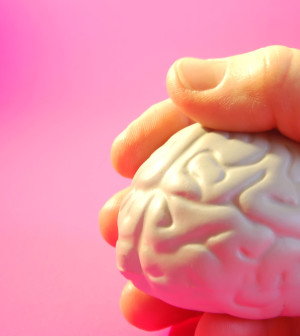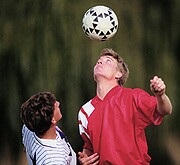- Could Your Grocery Store Meat Be Causing Recurring UTIs?
- Are You Making This Expensive Thermostat Error This Winter?
- Recognizing the Signs of Hypothyroidism
- 10 Strategies to Overcome Insomnia
- Could Artificial Sweeteners Be Aging the Brain Faster?
- Techniques for Soothing Your Nervous System
- Does the Water in Your House Smell Funny? Here’s Why
- Can a Daily Dose of Apple Cider Vinegar Actually Aid Weight Loss?
- 6 Health Beverages That Can Actually Spike Your Blood Sugar
- Treatment Options for Social Anxiety Disorder
Extra Bed Rest May Not Be Best for Kids With Concussions


For teens who suffer a mild concussion, more rest may not be better — and may be worse — in aiding recovery from the brain injury, new research suggests.
The researchers compared five days of strict rest to the traditionally recommended day or two of rest, followed by a gradual return to normal activities as symptoms disappear.
The Medical College of Wisconsin researchers found no significant difference in balance or mental functioning between teens who rested five days and those who rested one to two days.
What’s more, those children assigned to five days of strict rest reported more symptoms that lasted longer.
“Being told to rest for five days increased your rating of physical symptoms in the first few days and increased emotional symptoms every day for the next 10 days,” said lead researcher Dr. Danny Thomas, an assistant professor of pediatrics and emergency medicine at the medical college.
Physical symptoms included headache, nausea, vomiting, balance problems, dizziness, visual problems, fatigue, sensitivity to light or sound, and numbness and tingling. Emotional symptoms included irritability, sadness, feeling more emotional and nervousness, he said.
“We should be cautious about automatically imposing excessive restrictions of activity following concussion,” Thomas said. “We should follow the current guidelines, which recommend an individualized approach to concussion management,” he added.
The findings of the small study were published online Jan. 5 in the journal Pediatrics.
A concussion is a type of brain injury that can cause a short loss of normal brain function. Concussions are a common type of sports injury resulting from a blow to the head or impact from a fall.
For the study, Thomas and colleagues randomly assigned 88 patients aged 11 to 22 years to one to two days of rest followed by a gradual return to normal activities or five days of strict rest. That meant no school, work, or physical activity.
Patients in both groups said they had about a 20 percent decrease in energy exertion and physical activity. Predictably, patients assigned to five days of rest missed more days of school than those assigned to one to two days of rest.
“Strict rest for five days immediately after concussion did not help teenagers get better, compared to our current advice of one to two days of rest followed by a gradual return to activity,” Thomas said. “We found that teenagers instructed to rest for five days actually reported more symptoms over the course of the study.”
Dr. Sayed Naqvi, a pediatric neurologist at Miami Children’s Hospital, said many people think that strict rest after a mild concussion is the best treatment and improves recovery.
“People who rest and concentrate on their symptoms may suffer more than those who take some rest but engage in mental activities that take attention away from their symptoms,” he said.
Naqvi advises that children who suffer a concussion should rest for at least 48 hours, meaning no physical activity. But they should engage in some mental activities, such as reading or playing video games, he said.
More information
To learn more about concussions, visit the American Association of Neurological Surgeons.
Source: HealthDay
Copyright © 2026 HealthDay. All rights reserved.










